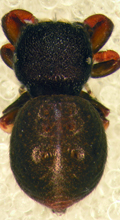Latest News Archive
Please select Category, Year, and then Month to display items
12 October 2020
|
Story Arina Engelbrecht
|
Photo Supplied
 Arina Engelbrecht from Organisational Development and Employee Well-being believes physical activity has a number of benefits for one’s health, including stress relief.
Arina Engelbrecht from Organisational Development and Employee Well-being believes physical activity has a number of benefits for one’s health, including stress relief.
Being physically active plays a big role in preventing the development of mental-health problems and in improving the quality of life of people experiencing mental-health problems.
Treatment for depression
Physical activity can be an alternative treatment for depression. It can be used as a stand-alone treatment or in combination with medication and/or psychological therapy. It promotes all kinds of changes in the brain, including neural growth, reduced inflammation, and new activity patterns are formed that promote feelings of calm and well-being. It releases endorphins – powerful chemicals in the brain that energise your spirit and make you feel good.
Physical activity can be very effective in relieving stress. Research in adults has found that physically active individuals tend to have lower stress levels compared to individuals who are less active. It also leads to improved sleep. When a person sleeps better and feels more rested, overall quality of life improves. They cope better with daily life stressors.
Reduce Alzheimer's risk
Regular physical activity can reduce your risk of developing Alzheimer's disease by up to 50%. It can also slow down further deterioration in those who have already started to develop cognitive problems. It stimulates the brain’s ability to maintain old connections as well as to make new ones.
A study asked people to rate their mood immediately after periods of physical activity (e.g. going for a walk/run, cycling, doing housework) and periods of inactivity (e.g. reading a book or watching television). Researchers found that participants felt more content, more awake, and calmer after being physically active compared to after periods of inactivity.
In conclusion, people who are physically active feel a sense of well-being, feel more energetic throughout the day, sleep better at night, have sharper memories, and feel more relaxed and positive about themselves and their lives.
“Being physically active not only changes your body, it changes your mind,
attitude, and your mood.” – Arina Engelbrecht
UFS entomologists describe a new spider species
2014-02-19
|
 |
It is about 3mm in size and almost looks like a ladybird, but this new spider is the cause of great excitement at the University of the Free State’s (UFS’s) Department of Zoology and Entomology.
The new species of spider, now known as Rhene amanzi, was recently described for the first time and was ‘introduced’ to other arachnologist at the recent congress of the African Arachnology Society at Amanzi Private Reserve.
Dr Charles Haddad, senior lecturer in the UFS’s Department of Zoology and Entomology, said they already stumbled upon the male spider in 2010 when a student was doing research at the reserve. After a very long process, the spider was described and a couple of weeks ago, whilst at the congress, they also found the female.
“Up to now we only know that the spider lives in trees in the Brandfort area. The range could be wider, but since it was only described recently, other arachnologists will only now be able to identify accurately.”
Dr Haddad says they still have to determine how many eggs the female is able to lay, what the spider’s life cycle looks like and what their habitual preferences are.
“What we do know is that it probably isn’t poisonous and that the spider imitates a ladybird in order to protect itself against predators.”